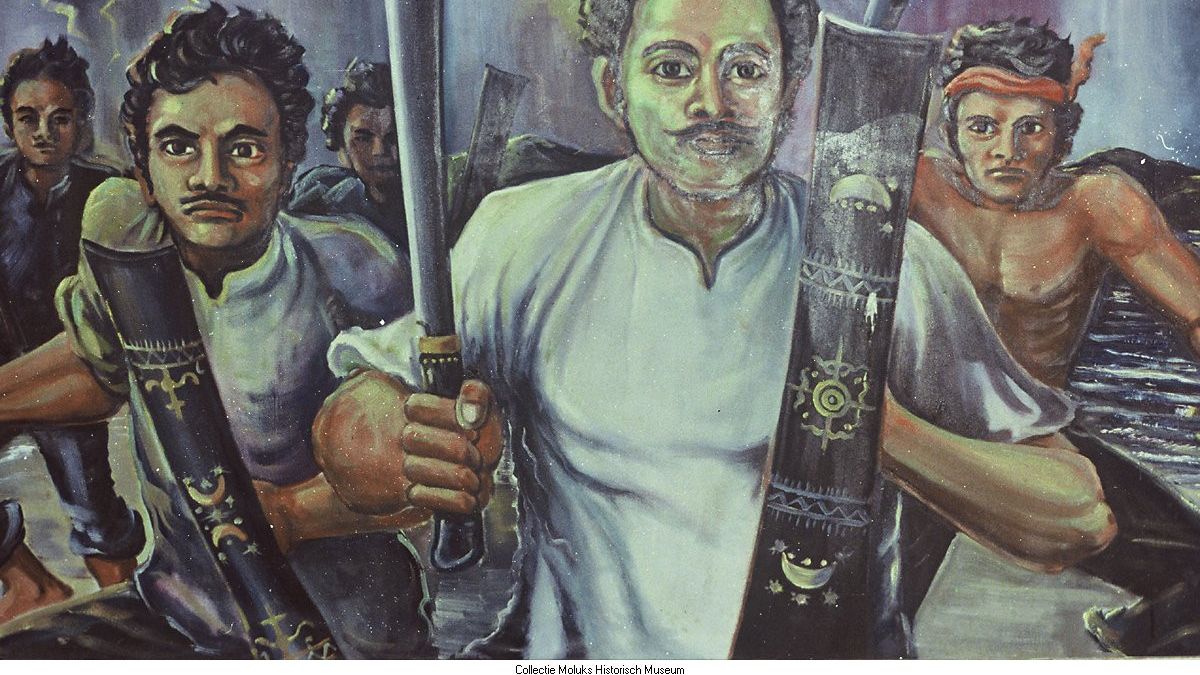JAKARTA - Ustaz Adi Hidayat's (UAH) lecture material has gone viral again. The famous preacher revealed that the narrative of Kapitan Pattimura who is widely known as Thomas Matulessy is a distortion of history.
The Dutch colonialists were behind it. As a form of agenda to reduce the role of Islam, he said. UAH said that Pattimura's real name was Ahmad Lussy. Not Thomas Matulessy. Ahmad Lussy is predicted by UAH as a Muslim hero. Religious leaders (kiai) too. Is it true that the narrative sung by UAH?
The world of social media Twitter was shocked by a fragment of a lecture from UAH on Sunday, July 3. The owner of the tweet @yaniarsim seasoned the story with provocation sentences. He said Islamophobia has existed since the Dutch colonial era.
Efforts to foster hatred and prejudice against Islam and Muslims were carried out by the Dutch Colonial Government by deliberately reducing the role of Muslim fighters. He also gave an example that the name of Kapitan Pattimura who is widely known as Thomas Matulessy is a lie. Because, his real name is Ahmad Lussy.
“Islamophobia has been around since colonial times. Turning the history of a Muslim fighter Ahmad Lussy by the name of Thomas Matulesy. A fear, hatred or prejudice against Islam or Muslims in general," reads the Twitter account @yaniarsim.
Islamophobia has been around since colonial times. Bending the history of a Muslim fighter Ahmad Lussy by the name of Thomas Matulesy... pic.twitter.com/6vezz389v5
— @N'$ (@yaniarsim) July 3, 2022
The content of the lecture is no less provocative. UAH seemed to be throwing questions at the congregation. He asked everyone to look back at the Rp. 1000 bill. Not the new Rp. 1000 money. UAH refers to the picture of Kapitan Pattimura which was first issued on November 29, 2000.

Everyone recognized the figure of Kapitan Pattimura who was widely known as Thomas Matulessy. UAH denied that Thomas Matulessy's name was Kapitan Pattimura. In his view, Kapitan Pattimura is Ahmad Lussy. Islam too.
It is believed that this historical distortion was carried out by the Dutch colonialists deliberately so that the role of Islam was not heard. In fact, that is what the general public then believes at this time, Kapitan Pattimura is a Christian. Not Islam.
“I want to ask you who wants to play with our history, so that their children and grandchildren do not understand about the fighters in the past. Who is Ahmad Lussy, he is a fighter, he is a kiai, he is a pesantren leader. He directed his students to fight for the truth in this motherland. That's why Ahmad Lussy suddenly became Thomas."
“I want to say that if you mention Thomas, people don't remember that this person is close to Allah Subhanahu wa ta'ala. This person is from a boarding school. That's why the names were discarded just like the westerners used to do. Ibn Sina became Avicenna. Yes, Ibn Rushd became Averroes and so on. The name was changed so that the next generation would not remember that there are people who when realizing their independence the night is tahajjud. In the afternoon, guerrilla fasting and so on," explained UAH in his lecture.
Kapitan Pattimura Not Ahmad LussyThe tweet went viral. Even the statement from UAH that called Thomas Matulessy as Ahmad Lussy caused controversy. Various groups of people think that UAH's view is wrong and inconsequential. Because, from various historical sources, it is said that Kapitan Pattimura is Thomas Matulessia or Thomas Matulessy.
The newspaper De Curaçaosche courant, published in October 1818, for example. The mass media reported the beginning of the Pattimura rebellion until it was defeated by the Dutch East Indies Colonial Government.
His rebellion led to the execution of Pattimura along with Kapitan Anthone Rhebok, Lieutenant Philip Latumahina, and Said Command (Raja Siri Sori Islam) outside Fort Victoria, Ambon, in December 1817.
None of the narrative reports reveal that it was Ahmad Lussy who announced the rebellion at that time. After 130 years the narrative remains the same. The May 1955 edition of the De Nieuwsgier newspaper, continued to write Thomas Matulessy. Not Ahmad Lussy.
Historian's OpinionHistorian Sam Ardi also spoke up. UAH is said to be incompetent in digging up reading references. It is believed that UAH only uses one source to corroborate the alleged reduced role of Islam in Indonesia's historical trajectory. The reference is none other than Ahmad Mansur Suryanegara's fiction book entitled Api History Volumes 1 and 2 (2015).
For him, the intentions of the owner of the book are good. Moreover, as an attempt to correct history. The book, however, has many fairly basic flaws. Among other things, the use of historical sources that are not critical and incomplete. This means that UAH claims cannot be justified. Moreover, so far there has been no source that points to the name Ahmad Lussy.
"In history, it is precisely those who mention Ahmad Lussy's name who must mention the historical source. So when asked about the naming of Thomas Matulessia to Ahmad Lussy, the person who mentions Ahmad Lussy must mention the source because until now there has been no historical source leading to that name."
"By not mentioning historical sources related to the statement, it will be difficult to carry out the heuristic and historical source criticism stages. People who live in 2022 can be very confident in explaining an event or character who lived hundreds of years ago without mentioning historical sources, that's already weird," said Sam Ardi to VOI, July 6.
Sam Ardi's answer is confirmed by historian Christopher Reinhart. He is of the view that so far there is no reference that mentions Thomas Matulessy's name in fact Ahmad Lussy. Reinhart also revealed that the view that Pattimura is a Muslim is also unjustified.

This effort is nothing more than an invitation to highlight the role of one group. In fact, many groups took up arms against the invaders. The struggle to release the shackles of Dutch colonialism is not just a monopoly of Muslims. In simple language, the narrative developed by UAH regarding Kapitan Pattimura Islam tends to be inconsequential.
“I now see a fairly systematic effort to highlight the role of one group in our historiography. And, nowadays it is not only written by ordinary people, but also by academics who have doctorate degrees and so on (though sometimes not from the science of history). Well, actually continuous research on history is good, but once again the historical method (heuristics, criticism, interpretation, historiography) must really be implemented.”
"And usually conclusions that are quite dubious (and maybe inconsequential) like this arise if from the beginning a researcher already has a subjective goal (for example: the researcher wants to highlight the role of Muslims), in the end he will only look for sources that support his goals and rule out other sources that he deems inappropriate. In fact, historical research has to look for as many sources as possible in order to compare sources," Christopher Reinhart told VOI, July 6, responding to a UAH lecture about Pattimura's real name.
The English, Chinese, Japanese, Arabic, and French versions are automatically generated by the AI. So there may still be inaccuracies in translating, please always see Indonesian as our main language. (system supported by DigitalSiber.id)








